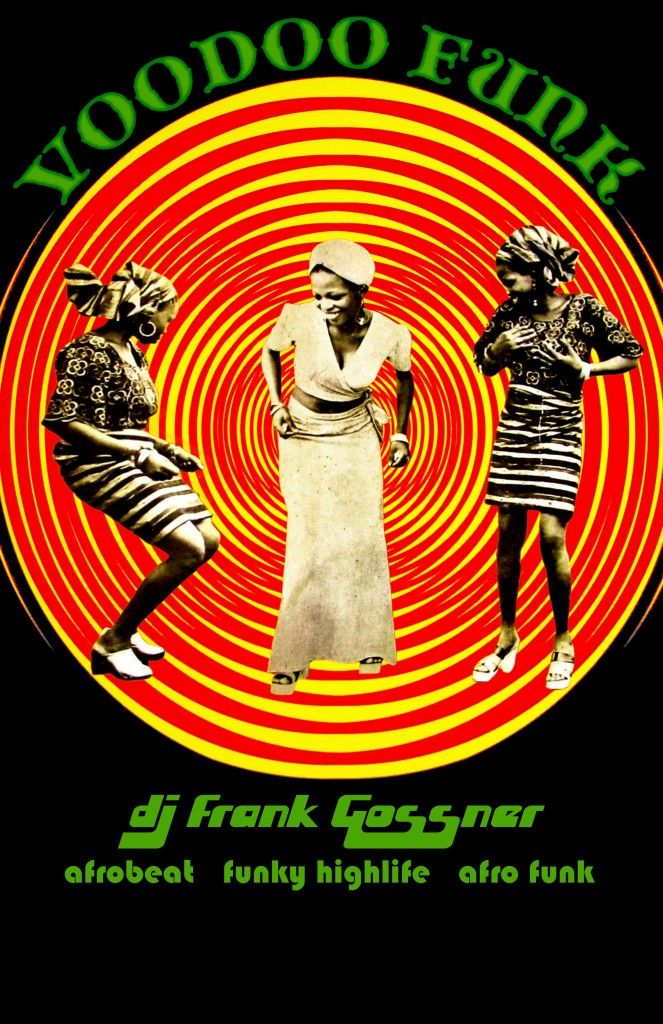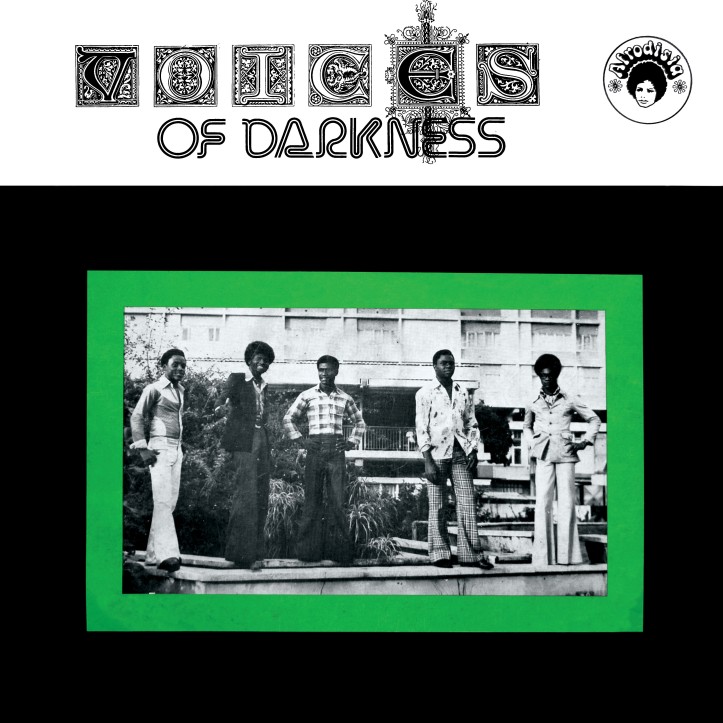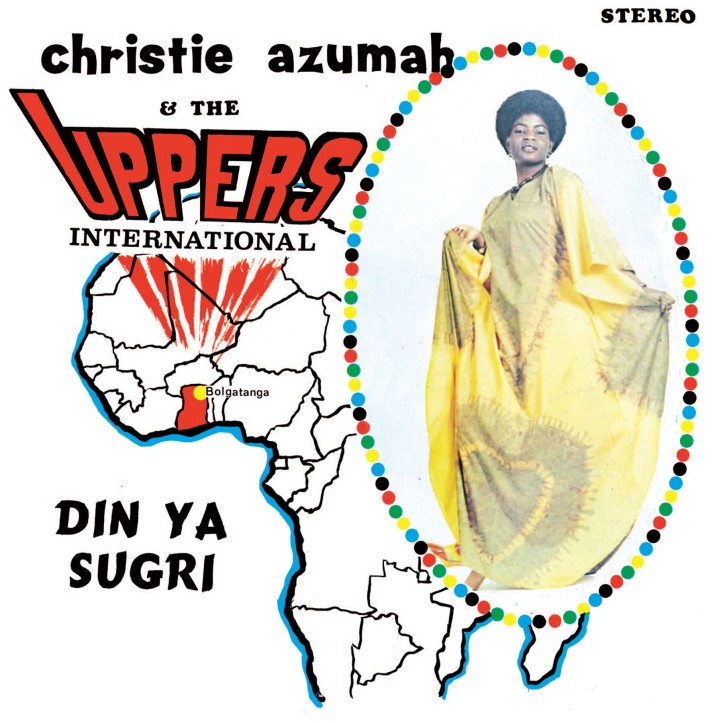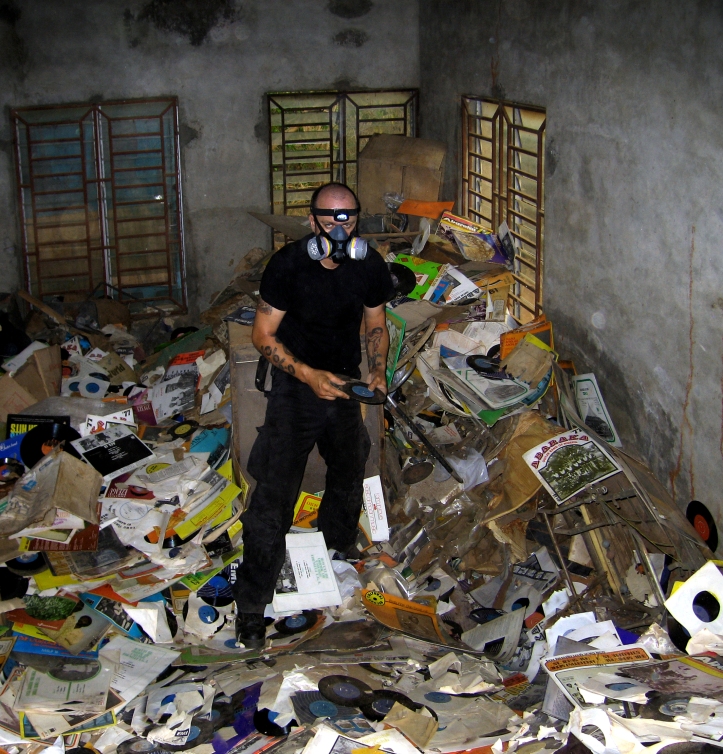Scroll down for more about music from across West Africa:
Voodoo Funk feature and interview:
 Frank Gossner started the Voodoo Funk mission in 2005 after he took a plane to West Africa and toured Guinea, Sierra Leone, Ghana, Benin and Nigeria to build up a unique collection of rare African Funk records. He hosted a radio show in Freetown, the capital of Sierra Leone, while also holding club nights at various nightspots in the Guinean capital, Conakry. In 2008, he returned to NYC and kept his network of Ghanaian and Nigerian agents who continued to supply boxes of records.
Frank Gossner started the Voodoo Funk mission in 2005 after he took a plane to West Africa and toured Guinea, Sierra Leone, Ghana, Benin and Nigeria to build up a unique collection of rare African Funk records. He hosted a radio show in Freetown, the capital of Sierra Leone, while also holding club nights at various nightspots in the Guinean capital, Conakry. In 2008, he returned to NYC and kept his network of Ghanaian and Nigerian agents who continued to supply boxes of records.

In 2009, Voodoo Funk re-released the legendary solo album by Pax Nicholas of Fela and the Afrika 70 fame together with his friends at Daptone Records. In 2010, Voodoo Funk put out the Lagos Disco Inferno compilation on Academy LP’s. Next came a retrospective of Ghanaian cult band The Psychedelic Aliens and various other re-issues of rare and often unknown West African funk and Afrobeat records. Highlights include both Marijata LPs, the Freedom Family album, a long lost Afrobeat record by Orlando Julius and a whole series of hard hitting Nigerian Deep Funk 45s. Further releases include the Martin Brother’s album Money and The Lagos Disco Inferno Vol.2 which was released as a series of 12″ Maxi Single.
 World Treasures Music spoke to Frank after the recent reissue of Mary Afi Usuah’s LP, Ekpenyong Abasi, from Nigeria in 1975.
World Treasures Music spoke to Frank after the recent reissue of Mary Afi Usuah’s LP, Ekpenyong Abasi, from Nigeria in 1975.
WTM – Mary Afi Usuah sounds like an African Grace Slick…
I always thought of her as the Nigerian Yma Sumac, but spiritually authentic instead of aimed towards a square exotica audience.
WTM – How do you track down the artists in terms of process – do you find the music/ record first and go from there?
There are tons of records that I’d like to reissue, but it can be difficult to get the licensing done. Sometimes the artists don’t even want their music re-released at all. Mary Afi Usuah’s family for example was in doubt if the album we just released should be reissued at all. If it hadn’t have been for my friend Uchenna Ikonne, who had been in touch with them previously and who also had been a student of Mary’s arts and drama classes at the university of Calabar, this record most likely would not have gotten a new release.
 WTM – How did you meet Uchenna?
WTM – How did you meet Uchenna?
I met Uchenna online at first due to our common passion for Nigerian Funk music. Uchenna lives in Boston so we met in person a few times while I was living in NYC.
WTM – You are focused on finding the artists or their families to credit their work and remunerate appropriately. How challenging is this? What other labels do you see doing the same?
There’s way too much music out there for the tired old “… but we couldn’t find the artist, so we just pressed the record without proper licensing” excuse to carry any validity at all. It’s just a lame excuse employed by the thieves and the clueless. Both types are not rare at all in today’s or yesterday’s music industry.

WTM – How did you get into reissuing music from Africa?
That just happened, I know some people who own labels so this just came naturally. I’ve been making a living as a DJ and club promoter since 1994. As far as reissuing records. I enjoy it sometimes, other times it deeply annoys me. The music industry is an ugly beast with a smelly underbelly. Its half dead corpse has been wasting away for decades and now the whole putrid mess is being awakened into some sort of a zombie-like half life. Sometime I wish the nasty old beast would for once just roll over and die. I would certainly celebrate the end to all those “vinyl is making a comeback” articles printed by all these useless papers that nobody buys anymore… not even an ugly tree should have to die for this crap.

WTM – What has been your most joyous, eventful or challenging find?
Finding all three 45s by The Psychedelic Aliens definitely was extremely challenging, but not all that eventful, really.
This video shows them when they were handed the finished album.
Finding records isn’t always all that exhilarating. You could often say “the hunt is better than the kill” when you spend weeks in some remote place trying to locate an old radio DJ or the rumored stash of an old distributor and you can have the craziest experiences without ever finding a single good record. If you really dig for records and I’m not talking about walking into a record shop and browsing the crates – that’s record shopping and not digging. Digging is when your hands get dirty. Very dirty. Finding anything these days is a joyous event because finding a worthwhile record in playable condition anyplace in Africa in 2015 is very, very challenging. And as with many things in life, sometimes something really important can happen and you don’t even realize the significance while it happens. Like for example finding that otherwise “unknown” or better “unaccounted for” Orlando Julius record that even Orlando himself had forgotten about himself went down quite uneventful: I pulled it out of a dealer’s shelf while visiting him at his house in Lagos, “what in the hell is this? Have you ever seen this anyplace else? Seems rare, let’s slap the fucker onto the turntable”.
WTM – What have been some of the biggest regrets in terms of musical finds (have you found some holy grails, but never in good enough condition)?
As a rule I never regret anything and as a seasoned nihilist I would never worship any grails, holy or otherwise. They’re just records, some have scratches, it’s really not that big of a deal.
WTM – What are you doing now? Any digging trips planned?
I’m working on a new short documentary right now that focuses on Nigerian artists and the way they are being treated by some European record labels. I’ve lately been getting into a few non-record related activities, but it’s too early to talk about that.

WTM – Have you had any scary moments in Africa?
Yes but not record related. In 2007, my wife and I had to flee our home in Guinea due to heavy fighting between the military, the police and various opposition groups. The plane that was supposed to take us out refused to take our three dogs on board so we took to the road and fled to Sierra Leone with our car. Fleeing through a country under martial law was quite a memorable experience.
WTM – How much more music is out there? Has the boom time gone or do you always remain optimistic to find more?
I guess the Ghanaian funk and afrobeat discography is pretty much exhausted and for the most part accounted for by now, with maybe a handful of exceptions when it comes to albums and probably a few dozen 45s that will manage to fall through the cracks of time. Nigeria on the other hand still has loads of yet undiscovered stuff. I always cringe a bit when hearing or using the word “discovery” in this connection. These “discoveries” are only discoveries for us who have been completely ignorant to generally all African culture for decades.
One important thing that needs to be established: I’m not a musicologist. I’m a fan. It never crossed my mind to build an archive, or to become a curator for music from West Africa, or even a specialist on music to come out of Ghana, Benin or Nigeria. Some records I use for DJing while a lot of other records I just enjoy listening to at home. As a DJ I play the shit that I feel might make me and everybody else party all night and act like the drunk idiots who we are, but that’s me playing my favorite party records and not some musicologist teaching you about traditional Nigerian or West African music. I play vintage, Nigerian pop music and my approach is completely non-academic. I buy records that I like and I play them in clubs to simply have a good time. I love good times, but I despise pretense.
WTM – Any future releases you want to let us know about?
I’m currently working on a series of Edo Funk 12″s. Edo music comes from Benin City (no relation to Benin the country!), the capital of Edo State in south-east Nigeria. Edo funk emerged out of highlife music that was traditionally performed at funerals which often turned into all night parties. Some consider Edo funeral music to be the source for New Orlean’s Brass Band culture. By the late 70s Edo music became strongly infused by then popular funk and disco music. The result is an absolute riot.
WTM – How did the Eno Louis release came about?
The usual route. I got the record and was stunned how perfectly it mended Edo funk with boogie. I asked Uchenna if he knew Eno and of course the two were already Facebook friends.

WTM – What is the most rewarding part of your job/musical quest?
My wife and I rescued three African gutter dogs straight from the mean streets of Conakry and watching them roam through our large garden in the mountains of Costa Rica makes me feel more rewarded, more warm and fuzzy inside than what any record could ever do for me. They’re my most treasured finds ever. Records are just things, one day I’m going to sell them all and buy a few horses with the cash, now that I expect to be an extremely rewarding experience.
Frank’s African digging adventures are chronicled at www.voodoofunk.com, together with over 40 hour-long mp3 mixes and countless photographs.
All images and clips courtesy of Voodoo Funk.


Sahel Sounds Interview:
World Treasures Music spoke to Sahel Sounds label boss Christopher Kirkley about his new film and releases for the fantastic label. Founded in 2009, he began his “exploration of sound and music in West Africa, particularly in the Sahel region of Mauritania, Mali, and Niger”.
WTM – The label finds such rare and esoteric sounds. What inspired you to start the label?
The label began officially when I started releasing records in 2011. I had just returned from a year and a half living and traveling in West Africa, concurrently running a blog that documented music via field and found recordings. The music in the Sahel is vast and varied – I found all sorts of things that you couldn’t find at the record store or on the internet. The label was a good way to share and publish this music. It was also a way to compensate my friends who I had spent the past year recording. I thought I’d make one or two records, but I was overwhelmed by the interest in it, and have continued since then.
WTM – How is the film coming along?
Our film is nearly finished after nearly a year of work, and we’ll be premiering it in January. It was a tremendous amount of work for all of us to pull it off, shooting in eight days, and piecing together all the parts afterwards into something coherent. But we were helped by a team of natural actors and some amazing music.
WTM – How have the artist tours been going?
We’ve had four tours now, two with Mamman Sani and two with Mdou Moctar. They’ve been well received and played some amazing shows. After their music has traveled so far, it was a nice conclusion to have them able to travel as well.
WTM – What’s next for the label?
The past year has been very busy with the film and tours, but this year I’m planning on releasing a lot of records that have been in the queue for a long time. I’ve found some amazing old recordings from Niger and Mauritania, which are important sonically, but also historically. I’ve also been working with some young producers from Niger and Mali to create some new sounds. I’d like to get a band in a studio to try my hand at producing something. There’s always new stuff happening in the Sahel and people are sending me music all the time too – so I try to keep an open schedule to see what may happen next.
Film details: click here
Christopher’s own posts on helping to make the film: click here and scroll down to ‘all gold everything’ post
(Images and content – sahelsounds.com)
Ghana:
Stevoo, a modern Griot artist who play the kologo—a two-stringed lute:
Bola – Unearthed by Awesome Tapes From Africa.
Niger
Mamman Sani (legend!) from Niger. Check out the studio performance and this hugely fascinating documentary.
Mdou Moctar – ace and touring in Europe. See http://sahelsounds.com/ website for more info.
Nigeria
Nollywood cinema can be enjoyed all over Africa. Here’s some sounds from an inspired soundtrack.
One of the most far-out space-jams of any country, continent, planet, etc – William Onyeabor:
Mali
Mamelon – Koumba FriFri. Featured on Balani Show Super Hits LP and Mamelon 7″, available from Sahel Sounds / Boomarm Nation:





